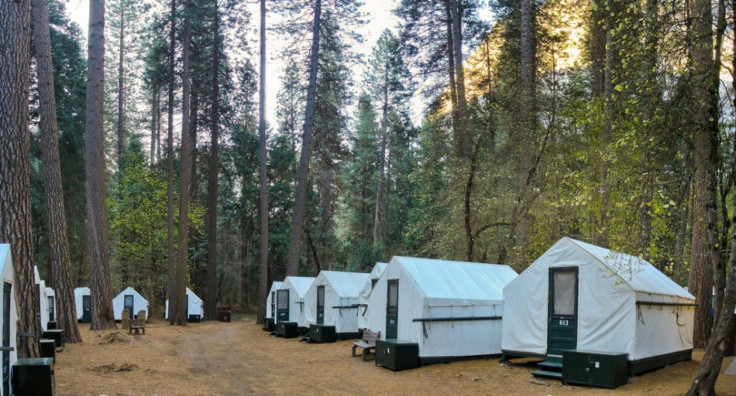Hantavirus At Yosemite National Park Should Not Deter Guests, Officials Say

Yosemite National Park officials have now closed 91 cabins in Curry Village that are at the center of a probe into how two people died and four others came ill with the rare mouse-borne hantavirus.
Four of the six hantavirus cases occurred in guests who stayed at the "signature" double-walled tent-cabins of the Boystown area of Curry Village, which has about 400 units. Park officials initially sanitized the cabins and kept them open but announced Thursday that they would be closed indefinitely. During the cleanup, park staff found holes chewed into the insulation, several mouse nests and evidence of rodents embedded in the walls, the park service said.
Hantavirus is carried in the feces, saliva and urine of deer mice and other rodents, and park officials now believe the double-walled design enabled the mice to nest between the walls. Most infections are caused by droppings that have been stirred up into the air, but the illness has an incubation period of one to six weeks. The virus does not spread from human-to-human and, most cases are isolated, leaving public health officials perplexed as to how so many people came down with the virus at the same time.
Though half of the 24 hantavirus cases in 2011 ended in death, the virus has a mortality rate of about 37 percent, according to the Centers for Disease Control
Yosemite National Park and the California Department of Public Health warned Wednesday that all visitors who lodged in the Boystown area of Curry Village between June 10 and Aug. 24 should seek medical attention if ill. Park officials sent out letters and emails to 2,900 visitors warning them that they may have been exposed to the disease.
"The health of our visitors is our paramount concern, and we are making every effort to notify and inform our visitors of any potential illness," said Don Neubacher, Yosemite National Park Superintendent. "Because people often don't get sick from hantavirus until one to six weeks after exposure, we are encouraging anyone who stayed in Curry Village since June to be aware of the symptoms of hantavirus and seek medical attention at the first sign of illness."
Yosemite receives about 4 million tourists each year, but many have reconsidered visiting for the upcoming Labor Day weekend. Officials assured prospective visitors Thursday, however, that they had conducted additional rodent trapping and were increasing rodent-proofing measures in tent cabins and buildings throughout the park.
"Yosemite National Park is encouraging people to keep their plans to visit Yosemite and to enjoy all the park has to offer," the park said in a statement. All guests, it said, should remember to keep food in sealed containers, minimize storage of luggage and other materials on floors, refrain from touching or handling rodents and take care not to stir up dust.
This is not the first time Yosemite has had a hantavirus case. In 2010, a 54-year-old woman was diagnosed with hantavirus about two weeks after a visit to Yosemite. She recalled seeing mouse droppings and watching the rodents skitter across her floor.
Her illness sparked a hantavirus risk assessment for the park's Tuolumne Meadows campsite, where she stayed. The CDPH concluded that the park lacked necessary protocol for mouse prevention, used inadequate sterilization methods and had tents with gaps that could allow mice to get inside. It also recommended that each unit have an information sheet on how to prevent hantavirus.
Park officials have acknowledged that they did not implement all of the proposed safety measures.
The park is now handing out hantavirus warnings and safety procedures in addition to bear warnings and other information that goes out with each reservation confirmation for units booked within the park.
© Copyright IBTimes 2025. All rights reserved.






















